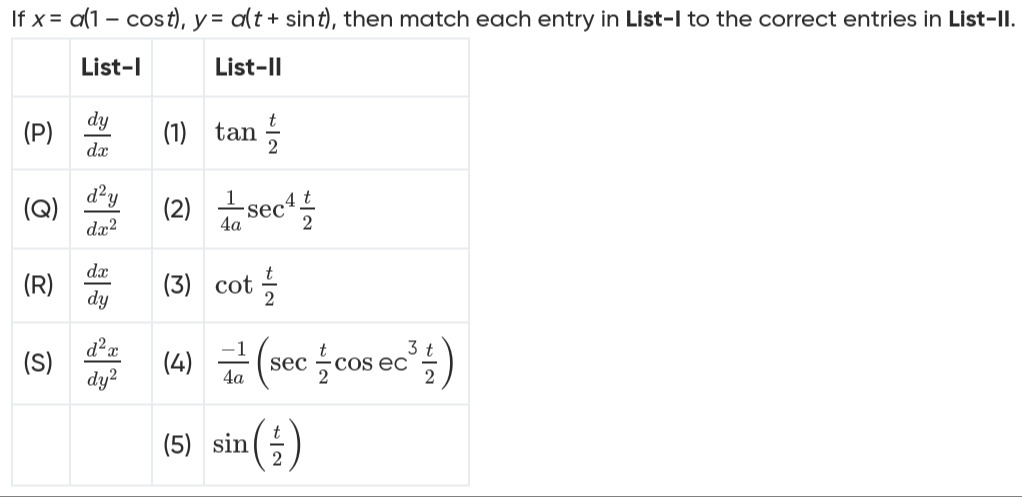Question
Question: If $x = a(1-cost)$, $y = a(t + sint)$, then match each entry in List-I to the correct entries in Lis...
If x=a(1−cost), y=a(t+sint), then match each entry in List-I to the correct entries in List-II.
| List-I | List-II | ||
|---|---|---|---|
| (P) | dxdy | (1) | tan2t |
| (Q) | dx2d2y | (2) | 4a1sec42t |
| (R) | dydx | (3) | cot2t |
| (S) | dy2d2x | (4) | 4a−1(sec2tcosec32t) |
| (5) | sin(2t) |

(P) ↔ (3), (Q) ↔ (4), (R) ↔ (1), (S) ↔ (2)
(P) ↔ (1), (Q) ↔ (2), (R) ↔ (3), (S) ↔ (4)
(P) ↔ (3), (Q) ↔ (1), (R) ↔ (4), (S) ↔ (2)
(P) ↔ (4), (Q) ↔ (3), (R) ↔ (2), (S) ↔ (1)
(P) ↔ (3), (Q) ↔ (4), (R) ↔ (1), (S) ↔ (2)
Solution
Given x=a(1−cost) and y=a(t+sint). We find dtdx=asint and dtdy=a(1+cost).
(P) dxdy=dx/dtdy/dt=asinta(1+cost)=2sin(t/2)cos(t/2)2cos2(t/2)=cot(t/2). Matches (3).
(R) dydx=dy/dtdx/dt=a(1+cost)asint=2cos2(t/2)2sin(t/2)cos(t/2)=tan(t/2). Matches (1).
(Q) dx2d2y=dxd(cot(t/2))=dtd(cot(t/2))⋅dxdt. dtd(cot(t/2))=−21csc2(t/2). dxdt=asint1=2asin(t/2)cos(t/2)1. So, dx2d2y=−21csc2(t/2)⋅2asin(t/2)cos(t/2)1=−4asin3(t/2)cos(t/2)1=−4a1csc3(t/2)sec(t/2). Matches (4).
(S) dy2d2x=dyd(tan(t/2))=dtd(tan(t/2))⋅dydt. dtd(tan(t/2))=21sec2(t/2). dydt=a(1+cost)1=2acos2(t/2)1. So, dy2d2x=21sec2(t/2)⋅2acos2(t/2)1=4acos4(t/2)1=4a1sec4(t/2). Matches (2).
Matches: (P)-(3), (Q)-(4), (R)-(1), (S)-(2).
